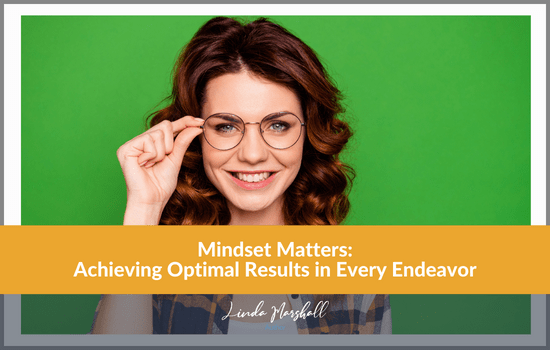Our mindset and emotional intelligence affect our thinking and ultimately determine our potential. I shared the power of our mindset in my book, The Power of Emotion.
THE POWER OF EMOTION | CHAPTER 21 | OVERVIEW
The Mindset Blueprint: Building Your Path to Optimal Results
 Many fail to recognize the significant role our mindset plays in our lives.
Many fail to recognize the significant role our mindset plays in our lives.
What is Mindset?
Essentially, our mindset is a group of thoughts and beliefs that form our thought habits; it’s our frame of mind. Through our perspectives, we process and review actions that shape our emotional experiences.
Focusing on my mindset has positively impacted my life. Through this practice, I've managed adversity, become more self-aware, increased my emotional intelligence, and developed my growth mindset. I discuss this at length in my book.
The Remarkable Power of a Positive Mindset
The benefits of a positive mindset are immeasurable. Positive self-talk and mindset are closely connected as they influence an individual's thoughts, beliefs, emotions, and overall outlook. Starting your day with the right mindset reduces negative self-talk. This blog, The Magic of Self-Talk: Four Remarkably Simple Practices for a Positive Mindset, will open your mind to the value of a positive mindset.
Emotional Intelligence And Growth Mindset Are Connected
The good news is that we can grow and advance our mindset, like emotional intelligence. Our self-awareness helps us become more emotionally aware, which assists us in regulating our attitude.
Accepting a growth mindset is not only possible; it’s desirable for many reasons, including as a tool that develops resilience.
What Type of Mindset do You Have?
There are two types of mindset to consider: fixed and growth. Without question, you want to embrace a growth mindset to be successful. Someone with a fixed mindset believes, "I am what I am," but with a growth mindset, the belief is, "I'm capable of anything." Undeniably, the way we think impacts the direction of our lives.
Individuals with a Fixed Mindset
Those with a fixed mindset believe their intellect and abilities are determined. They focus solely on their performance, believing their skills are restricted. They tend to dodge challenges and quickly give up. Often, they select the safest choice and are okay with settling instead of striving for more.
A fixed mindset can hinder personal growth by avoiding challenges, fearing failure, and resisting feedback. It may lead to stagnation and missed opportunities for learning and improvement.
Individuals With A Growth Mindset
A growth mindset fosters resilience and a willingness to learn from challenges, helping you adapt to new situations. Embracing effort as a path to improvement enhances personal and professional development.
Individuals with a growth mindset are concerned with self-improvement and are open to possibilities. Self-care and the care of others are a priority. These people trust their accomplishments are immeasurable and consider each challenge a learning opportunity.
Here are some strategies to develop a growth mindset:
-
Embrace challenges: View challenges as opportunities to learn and grow rather than obstacles.
-
Learn from criticism: See feedback as valuable input for improvement rather than a personal attack.
-
Cultivate curiosity: Stay curious about new ideas and approaches, fostering a love for learning.
-
Replace "I can't" with "I can't yet.": Acknowledge that you can develop skills with time and effort.
-
Set goals: Establish achievable goals that require effort, creating a path for continuous improvement.
-
Focus on the process: Value the journey of learning and development, not just the end result.
-
Celebrate effort, not just success: Acknowledge the hard work and dedication put into tasks, regardless of the outcome.
If you adopt a growth mindset, you will recognize your power, increase your emotional intelligence, and discover optimum results. It is a driver of success and will influence your personal development. I reflect on my personal experiences in chapter 21 of my book, The Power of Emotion.
This article was originally published on October 5, 2021, and has been updated (February 2024).
Get Social With Linda Marshall and Share
INSTAGRAM @LindaMarshallAuthor | FACEBOOK @LindaMarshallAuthor


